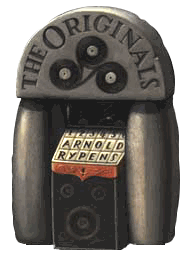HAND IN HAND, KAMERADEN
Created on 06/11/2001Latest update on 02/01/2024
Artist: Wilhelm Speidel
Author: Wilhelm Speidel
Year: 1887
In a songbook published by Franz Portius in Leipzig. Speidel (1826-1899) was a music teacher from Ulm who ran his own Künstler und Dilettantenschule in Stuttgart. The song became a real Wehrmachtslied in nazi Germany, while it also spread among football fields in Europe (see footnote). There's a book about this song: Het Lied Van Feyenoord by Jimmy Tigges & Paul Groenendijk (Nijgh & Van Ditmar).
Covers:
- 1927:
Isé Joëls [as A.S.V. Marsch - Atlantic Sport Vereniging; was the bandleader on the Volendam, a steamboat on the transatlantic Holland-Amerika Line]
- 1955:
Tante Leen [as Hand In Hand]
- 1958:
Abe Lenstra [Dutch football player as Geen Woorden Maar Daden; just those words and the melody that goes with it]
- 1961:
Jacky van Dam [from Rotterdam; hit in Holland in '63, the year Feyenoord started accumulating European football fame]
- 1963:
Legioen [Feyenoord supporters as Geen Woorden Maar Daden (Hand In Hand, Kameraden)]
- 1963:
Supporters FC Boom [idem; champions in Belgian third division A; song was heard all over Belgium too, from Tongeren to Turnhout]
- 1964:
Johnny Hoes [in medley]
- 1965:
- 1966:
Tony Bass [Ajax version]
- 1998:
Supporters Racing Genk [idem]
- 1999:
Cock van der Palm [swing version]
- 2001:
The refrain was heard in football circles in Belgium and Holland since the 1930s. Johnny Hoes, who played football with Rotterdam club COAL, remembered singing: 'Hand in hand, kameraden, hand in hand voor COAL 1'. After hearing it yelled by Feyenoord supporters in 1960, he approached accordion player Jaap Valkhoff with this same refrain to turn it into a whole song. The result was cut in 1961 with singer Jacky van Dam (real name: Jaap Plugers). That's when it was copyrighted with BUMA/STEMRA. The song first charted two years later, when Feyenoord became a major European football team. Once a hit, controversy broke out: Singer/comic Leen de Bruin claimed he wrote the song in 1934 when his football team SVV (Schiedam) celebrated its 30th birthday. He had a point: 'Leve SVV' indeed sounds more relaxed than 'Leve Feyenoord 1'.


